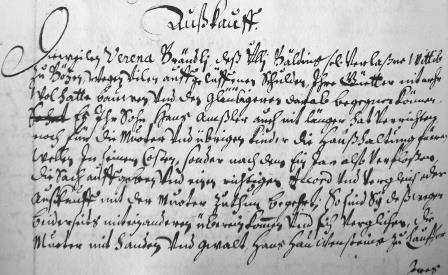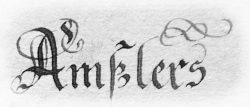A stepfamily in the 17th century
Little is known about the simple villagers of the Boezen area in the 17th century except the dates of birth, death and marriage. Occasionally, however, we do get a glimpse of life in those days, for example through historical sources outside the church books. In this article we examine excerpts from “choir court manuals” and court proceedings and learn about the fate of a stepfamily family in the 2nd half of the 17th century.
The Choir Court and its records – an instrument of control of the authorities of Bern
Originally the choir court 1) was a moral or marriage court. After the Protestant Reformation, secular matters increasingly came under its jurisdiction. It developed mainly into an effective instrument of control for the authorities of Bern. The historian Max Baumann explains this as follows: “The “gracious lords” wanted to regulate as many areas of the subjects’ lives as possible. The traditional medieval (and Catholic) cheerfulness and lust for life no longer found a place here” 2).
The Choir Court met regularly after the Sunday sermon in the church choir, hence the name Choir Court. The court dealt with misdemeanors of the inhabitants reported by designated spies. Among the offences were dancing, gambling, excessive drinking, swearing, quarrels and fights, as well as not keeping or missing marriage vows. In serious cases, the honorable choir judges and the village priest were supervised by the high bailiff from Schenkenberg (int link), the representative of the Bernese government. The deliberations, interrogations and fines imposed were meticulously documented by the village priest in the “choir court manuals”. These records provide revealing insights into the private lives of the people in Boezen. A great example is the marriage of Anna Heuberger.
The court proceedings and jurors from Effingen – a court for civil matters
The proceedings of the court from Effingen3) begin in 1668 and contain extensive reports on real estate transactions, letters of credit, bonds, auctions and judgments in disputes. Rather than a court of law dealing with misdemeanors, this court presided over notarization procedures. The records give a deep insight into the economic conditions and the manifold economic connections within the village community.
The court consisted of sworn jurors representing the three municipalities of Elfingen, Effingen and Boezen. The assembly consisted of a group of respectable citizens, who mostly belonged to the village upper class and usually held the office for life. The local bailiff presided, sometimes the high bailiff from Schenkenberg was also present as judge.
How the Amsler family came to be called “Beldi”
Occasionally these sources reveal extremely valuable genealogical information and illuminate local history. Thanks to the parish priest’s minutes of the hearings in the choir court and the records of the clerk in the court proceedings, we learn why my ancestor Hans Amsler came to be called “Beldi”, a nickname that would be preserved for more than a century.
Hans Amsler (1652-1729)
From the church records we learn that Hans Amsler was born in 1652 and died 1729:

On 4. January 1652 the parents Uli Houwberger and Catrina Kuntz had their daughter Susanna baptized, witnessed by Abraham Houwberger and Anna Ott.
eodem die (on the same day) Hanss Amsler was baptized, his parents were Hanss Amsler and Freni Braendli, witness were Hanss Hubeli and Freni Howberger
Source: Bözen KI02, Baptims Register 1604-1685, Page 125

Anno 1729.
The 28. June: Morgens bym Ersten Zeichen Leuetten verstarb der prestenhaffte Joggel Keller Zu Boezen in seinem wohl 60. Jahr alter an der Wassersucht.
Den 15. Februar: abendts starb dem Hans Schwartz ein 2. Jährig Töchterlein an dem Husten, namens Elsbeth
Den 20.ten Februar: starben dem Hans Weibel dem Ziegler zu Effigen sein flendes 4. Jährig Kindt an dem grasierenden Husten, names Babeli.
Den 16. Aprils: abendts gegen 9. Uhr starb zu meiner bestürtzung gantz unerwartet Elsy Rynicker des bauwen Schneider-Heirech tochter seines alters 28. Jahr, da es 2. Tag zevor noch aussgangen esgesehen.
Den 30. April: Starb der alte 77. Jährige Hans Amsler, sonst Baeldi – Hans genant von Alterschwachheit ohne Krankheit
Source: Bözen KI03, Death Register 1684-1750, Page 125
The remark “Baeldi” became the nickname of this Amsler family for the following generations. This was useful to distinguish the numerous branches of the Amsler families, who at that time lived in Boezen and the neighboring community of Effingen. One branch is later named “Beldi Schuhmachers”, this name remained until about 1800.
An unexpected discovery
Around 1660 we find the first Beldi family in Boezen. The Beldi originated from Ruefenach in the parish Rein, Canton Aargau, and so far had been unknown in Boezen. Between 1660 and 1667 Uli Beldi and Freni Braendli baptized 4 children:

Before that, Johannes Amsler and Verena Braendli baptized six children between 1649 and 1657:

At first sight these appear to be two different families, there is no indication of a possible connection between Amsler and Beldi.
The Effingen court records provides us with an unexpected insight in an entry dated January 2nd, 1677. It is a “buyout” (Ausskauff) that shows us how fate connected the Amsler and Beldi families and how Hans Amsler came by his nickname “Beldi Hans”:

Ausskauff
Diewylen Verena Braendli, des Ulli Baeldins sel. verlassne Wittib
zu Boetzen, wegen vilen auffgelauffenen Schulden, Ihre Guetter nit mehr
wol hatte bauwen und den Glaeubigeren darob begegnen koennen,
Es ihr Sohn Hans Amssler auch nit laenger Verrichten
noch fuer die Muoter und uebrigen Kinder die Hausshaltung fueren
wollen zu seinen Costen, sonder nach dem ein Jar als verflossen
die Sach auffgeben und einen richtigen Accord und Vergleich oder
Auskauff mit der Muoter zuthun begehrt; so sind sy desswegen
beidersetis miteinanderen uebereinkommen und sich verglichen, die
Muoter mit handen und gewalt, Hans Hauwenstein zu Lauffor
Ires

Ihres Vogts, fuer sich und innamen Ihren Kinderen, der Sohn aber
fuer sich selbsten und seine Erben. Und Habend dissen Auskauff
gethan wie folget: Namlichen, Soelle der Sohn all die ligen-
den Gueetter, so die Muoter bissharo besessen hat, zu Boetzen
Es seye Hauss, Ackern, Matten, Raeben, Holtz und Wald, mit
allen zugehoerigen Dingen, zu seinen Handen nemmen, fuer sein
eigen Guot hinfuero bauwen. Innhaben und besitzen und
zu solchen Worten und Gedingen
Dass er alle darauff stehenden Schulden soelle ueber sich nemmen,
seyend wenig oder vil, dieselben richtig machen und bezahlen.
Denne solle er auch die Kinder drauss erziehen, biss zu
Ihren tagen, da sy ihr Nahrung und Stuck Brot selbst erarbeiten
koennind.
Wann das die Kinder in die Ehe zu stellen begehrend, soeller er einem
Jeden fuenff gl. (Gulden) fuer die Morgengab 4) geben, damit soellend sy
von ihme aussgewiessen sein nichts mehr an ihme zufordern
haben.
Die Muoter betreffend, soelle der Sohn sy im Hauss lassen und by
ihm haben, so lang als sy will.
item, sölle er Ihnen ein Stuck Raeben, ist ein halbe Juchh(arten), lassen nutzen
so lang sy lebt, nach Ihrem todt aber soelle diss stuck Raeben
den uebrigen Kinderen gehoeren und zufallen, und er Sohn nuet daran
zu erben haben.
Und wann diss Stuck Raeben nur ein Soum wein gibt, soll der
Wein der Muoter allein bleiben, wann es mehr gibt, soellend
Sy den Wein miteinander theilen, zu halbem.
Dessen sind Gezeuegen, so darby gewesen, die Ehrsamen und
Heinrich Heuewberger Undervogt, Joggli Amssler, Ruodi
Brack, beid zu Efigen, Hans Hauwenstein zu Lauffohr,
Heinrich Baeldi zu Rüffenacht. AD Den 2. Jan. 1677
Summary of the above transcription
Verena Brändli, widow of the late Ulli Baeldin (Baeldin was a common spelling variation of the family name Beldi), has debts and is no longer able to manage her estates on her own. Her son Hans has been running the household at his own expense for a year and has supported his mother and siblings. Mother and son have now agreed that Hans will take over the estate as well as all debts and obligations. He also commits himself to provide for and educate the younger siblings until they can take care of themselves or get married. The mother is granted lifelong right of residence and a parcel of vineyard is given to her for own cultivation. This agreement is witnessed by the local bailiff Heinrich Heuberger, the jurors Joggli Amsler and Ruodi Brack from Effingen and Heinrich Baeldi from Ruefenach.
Genealogical findings

Although the death registers are missing between 1644 and 1704 (except for 2 pages during the plague years 1668/69), we can construct the family history based on the marriage and baptism registers. On december 13th, 1647 Verena Brändli married Hans (Johannes) Amsler from Effingen.
Hans is the son of bailiff Kaspar Amsler. The couple baptized 6 children between 1649 and 1657. Our protagonist Hans Amsler is the oldest son, born in 1652.
Just a few years later, on October 24th, 1659, Freni Braendli gets married to Uli Beldi.
This is the second marriage for Verena, she is the widow of Hans Amsler. The buyout contract of 1677 explicitly refers to the children of this second union with the note “the small children are to be educated until they can take care of themselves”.

We can therefore safely assume that Johannes Amsler, Verena’s first husband, died around 1657/58, at the age of only 32 years. Verena Braendli, a wealthy widow and in the prime of her years, soon found a new husband, Uli Beldi from Ruefenach, Canton Aargau, bringing her 6 children into the marriage. The coupled got married in 1659 and baptized four more children until 1667.
The second marriage is also a short-lived one. Uli Beldi may have become a victim of the plague that raged in 1668/69, but he certainly died no later than 1675. Verena Braendli, widowed for the second time, now had to support her ten children on her own. The children from her first marriage, although not yet grown up, actively supported her. However it was the oldest son Hans who held responsibility for the family. The buyout in 1677 confirmed his leading role as the actual head of the family.
Based on the buyout contract of 1677 and the church records, it is now clear that Verena Braendli was married twice, first to Johannes Amsler, then to Uli Beldi. The first-born son from her first marriage, Hans Amsler, was identified with his stepfather’s name after his father’s untimely death and was from then on known as “Beldi Hans”.
Around 1693, he appears as a court official in the court records of Effingen; he held this honorary office until his death in 1729.
The descendants of Hans Amsler, also known as “Beldi Hans”, now bore this nickname until the 18th century, a reminder of the fate of this stepfamily.
1) Das Chorgericht des bernischen Aargaus im 17. Jahrhundert, Willy Pfister, 1939
2) Leben auf dem Bözberg, Max Baumann, 1998
3) Effinger Gerichtsakten, Band 1 – Staate Archive Aarau; AA #1350
4) Explanation from the „Schweizer Idiotikon“: Morge(n)gāb:
a) A gift which, according to old Germanic custom, the husband gave to his newlywed wife the morning after the wedding in return for her virginity.
b) Gift or offering, which one spouse makes to the other (thus also the wife to her husband)




